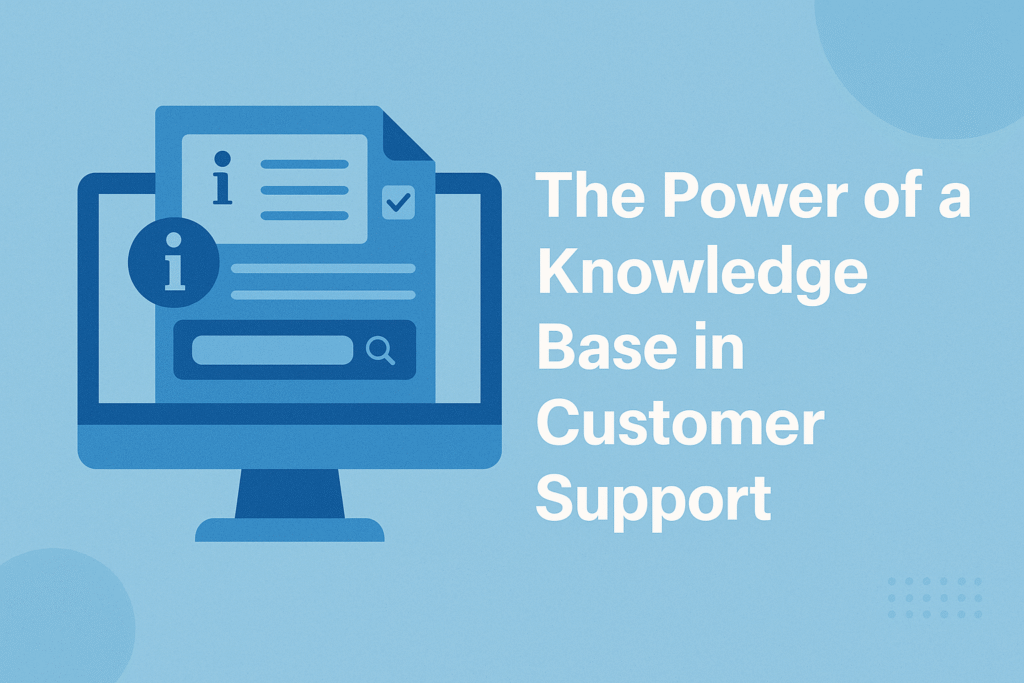The Power of a Knowledge Base in Customer Support
In the fast-paced world of customer service, one tool that stands out as a game-changer is the knowledge base. Whether you're a lean startup or a scaled SaaS company, a well-crafted knowledge base can dramatically transform how your support team delivers assistance and how your customers interact with your product or service.
In this blog, we’ll explore what a knowledge base is, why it matters, and how it can increase operational efficiency, reduce support costs, improve customer satisfaction, and help you scale with confidence.
What Is a Knowledge Base?
A knowledge base is a centralized digital repository of information that houses everything from frequently asked questions and how-to guides to product documentation, onboarding checklists, and internal troubleshooting processes.
Its primary purpose is simple yet powerful: deliver instant, accurate information — without always needing human support. This self-service approach empowers customers to resolve issues independently while enabling support teams to assist others faster and more consistently.
The Two Types of Knowledge Bases
1. Internal Knowledge Base (For Support Teams)
An internal knowledge base is designed for your support staff and internal stakeholders. It includes documents related to policies, troubleshooting flows, standard operating procedures, escalation paths, and tool instructions.
Benefits include:
- Reduced onboarding and training time
- Increased agent productivity and confidence
- Faster resolution of complex queries
- Support for just-in-time learning
2. External Knowledge Base (For Customers)
This is your public-facing help center — where customers go to find answers without reaching out to support.
Organize content by user needs such as:
- “Getting Started”
- “Billing & Payments”
- “Account Settings”
- “Technical Troubleshooting”
Pro Tip: Assign a Knowledge Manager or supervisor to review support tickets regularly and update content to keep it relevant and accurate.
Why a Knowledge Base Is Essential
Here are ten compelling reasons why every customer support team should invest in a knowledge base:
- Turns Your Support Center into a Strategic Asset — Offers consistent, accurate answers and builds trust.
- Improves First Contact Resolution (FCR) — Reduces escalations and increases issue resolution on first contact.
- Increases Customer Satisfaction (CSAT) — Fast and clear responses improve overall satisfaction.
- Reduces Support Ticket Volume — Decreases tickets by 30–40% through self-service.
- Accelerates Onboarding and Training — Centralized learning resources for new hires.
- Boosts Employee Morale — Reduces confusion and improves agent confidence.
- Enhances Team Productivity — Speeds up response time and increases efficiency.
- Ensures Consistent Messaging — Avoids miscommunication and confusion for customers.
- Offers 24/7 Global Support — Knowledge base is accessible any time, from anywhere.
- Solves Recurring Issues at Scale — Prevents repetition and enables faster resolution of complex issues.
Maintaining Your Knowledge Base: Best Practices
To keep your knowledge base effective:
- Use analytics to track views, bounce rates, and article helpfulness
- Conduct quarterly content audits
- Encourage agents to suggest new or updated articles
- Use templates to maintain tone and structure
- Organize based on user journey and internal job functions
Final Thoughts
A knowledge base is no longer a “nice to have” — it’s a strategic necessity. It enhances customer autonomy, accelerates agent performance, and helps your organization scale smarter.
By empowering customers to help themselves and enabling your team with instant access to the right information, you’ll build a more resilient and efficient support operation.
If you haven't implemented a knowledge base yet, now is the time. Your support team will become more productive, and your customers will reward you with loyalty.
Bonus Resources for Support Leaders
Are you a Customer Support Team Leader looking to sharpen your skills?
👉 Enroll in the Customer Support Team Leader Mastery Certification (Udemy)
Want to certify your team and elevate your support standards?

